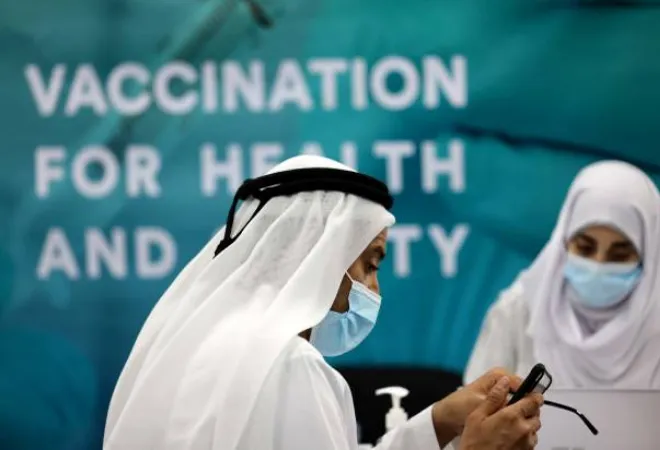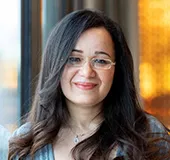 This article is part of the series The COVID-19 Vaccine Challenge: Contextual and Country Analysis.
This article is part of the series The COVID-19 Vaccine Challenge: Contextual and Country Analysis.
At the beginning of July, the United Arab Emirates (UAE) achieved the milestone of being “the world’s most vaccinated nation”, according to the Bloomberg tracker. At the time of writing, the nation has administered more than 16.3 million doses of vaccine, covering more than 77 percent of its resident population. While the daily new case rates of 1,500 are still on the high side, the trend is declining. The nation also has one of the lowest fatality rates in the world.
Reaching this landmark is a direct result of the UAE government’s meticulous management of the pandemic response over the past two years. It was certainly not an easy task. In line with the leadership’s directives, resident safety and health remain the main priorities, evident by the continued emphasis on the importance of vaccinations through a coordinated, multi-channel awareness campaign, as well as making the vaccine readily available for free to all residents. Adopting a “flexible and multi-track strategy” focused on providing necessary care and conducting mass trials early in the outbreak, has been a key driver behind the country’s successful response to the pandemic, as stated by the UAE’s Minister of Health and Prevention, HE Abdul Rahman Mohammed Al Owais. “Trust between the community and the government” was also another key driver of the success, coined by Dr. Farida Al Hosani, Executive Director of infectious disease at Abu Dhabi Public Health Centre, in her recent address during Arab Health 2021 conference.
In line with the leadership’s directives, resident safety and health remain the main priorities, evident by the continued emphasis on the importance of vaccinations through a coordinated, multi-channel awareness campaign, as well as making the vaccine readily available for free to all residents.
In parallel, the resumption of the economic sector within a new framework of operations has been a key focus, as demonstrated by the gradual ease of restrictions in the various emirates and within different sectors. The apparent approach being adopted is to link the two priorities; using ease of mobility as a motivator to get vaccinated. In mid-May, Dubai permitted hotels to operate at 100 percent occupancy, given that all its users are vaccinated. Attendance of concerts and sporting events also followed the same rules. While in Abu Dhabi, as of August 20th, proof of vaccination will be a pre-cursor to entry at shopping malls, gyms, recreational facilities, and restaurants, as announced by the Abu Dhabi Emergency Crisis and Disasters Committee earlier in June; thereby giving ample time to those who are not yet vaccinated to comply. To facilitate the safe ‘re-opening’, more stringent monitoring was put in place to ensure that precautionary measures in all public areas are abided by, including social distancing, masks, and sanitisation. While the Dubai municipality boasted a 97.7 percent compliance to precautionary measures in commercial establishments during the first half of 2021, it also did not shy away from reporting closures, warnings, and fines.
As the world struggles to keep up with the virus mutations and to tailor appropriate responses to protect its people, the UAE has shown an exemplary level of agility in tackling these changes and staying up-to-date with the science behind vaccines. During the first week of July 2021, Al Hosani announced the availability of booster shots aimed at strengthening immunity against coronavirus and its new strains. Since then, a continuous flow of updates has been shared with the public communicating the need for the boosters, eligibility and also warnings against misuse and over-vaccinating. Monitoring tools are providing authorities and the public with critical information about the variants’ presence, revealing that the Beta variant is the most common, followed by Delta and then Alpha, as reported by the National Emergency Crisis and Disasters Management Authority (NCEMA). Early on, the UAE has kept a keen eye on scientific research and has contributed to cure and prevention by participating in one of first vaccine testing trails as early as August 2020.
Major airlines such as Emirates and Etihad have ensured that their flight crew are all vaccinated and trained on the required precautionary measures, to welcome travellers on safe flights.
This success has not been without challenges. With summer arriving, the travel season in the UAE is now in full swing. Given the largely expat population and the importance of travel, particularly for Dubai, this was a vital issue for the country. As such, we’ve seen the government and the aviation industry in turn take strides in communicating the best approach to facilitate travel and ensure safety is upheld. One of the key local government portals for COVID information, Weqaya (meaning prevention in Arabic) posted a checklist for travellers early this month. Major airlines such as Emirates and Etihad have ensured that their flight crew are all vaccinated and trained on the required precautionary measures, to welcome travellers on safe flights. As with the rest of the world, the UAE is practicing a constant balancing act between safety and re-opening measures, with the ever-changing situation of countries on green, amber, and red lists. Referencing this at the Arab Travel Market in May, the President of the Dubai Civil Aviation Authority shared his cautious optimism about the expected increased air traffic during the summer and there-after.
As we move into the second half of the year, a few ‘events’ are bound to require a refinement or re-iteration of COVID regulations and its communication. Namely, the summer season, back-to-school, and EXPO 2020.
EXPO 2020 organisers have already started sharing information about their safety protocols, such as thermal cameras, staff vaccination, mask-wearing, and sanitisation.
In the immediate short term, we expect continued focus on travel and travel advisories as the global situation remains fluid, and UAE residents fly in and out of the country. An estimate of 450,000 travellers were expected to go through Dubai International Airport’s Terminal 3, during the first two weeks of July. With the end of the summer season, we expect to receive further guidelines from the government with regards to the upcoming academic year. As of now, education authorities at the emirate levels have initially approved return to in-class learning at 100 percent capacity. As stated, this decision is a result of survey assessments, consultation with all stakeholders, including teachers, parents, staff and reviewing practices of the international community. However, in the spirit of agility and student safety, the option of distance learning will also be available in schools that have that capacity. As we enter the final quarter of the year, EXPO 2020, with its expected 25 million visitors from 200 countries, will undoubtedly trigger further communication to ensure visitor and participant safety. EXPO 2020 organisers have already started sharing information about their safety protocols, such as thermal cameras, staff vaccination, mask-wearing, and sanitisation. Having already hosted a few ‘smaller’ conferences earlier this year, such as GISEC, Gulfood, Arab Health and Arab Travel Market; these protocols are no longer foreign to organisers, exhibitors, or the public.
Finally, the UAE is well-known for its support and endorsement of technology. In fact, smart solutions are critical driving enablers of its crisis management and response to the pandemic. The UAE has developed and dedicated several apps for tracking and tracing purposes that have served the community well in identifying infected community members and targeting the necessary support to them to ensure quick containment. Some apps, such as Al Hosn, are now essential facilitators for mobility both within the UAE and at its borders.
The UAE is a learning entity and will surely continue to harness its successes to transform its challenges to opportunities, as they lead their residents to a new normal, that is anything but normal!
The views expressed above belong to the author(s). ORF research and analyses now available on Telegram! Click here to access our curated content — blogs, longforms and interviews.



 This article is part of the series
This article is part of the series  PREV
PREV


